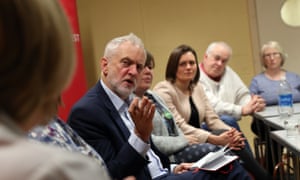Amelia Hill in The Guardian

How does it make you feel when your partner is cold and distant? Or when they’re critical and prickly? Does it make you want to rip their clothes off, order in a vat of whipped cream and install a chandelier to swing from?
No? Well there’s your problem – according, at least, to Michele Weiner-Davis, the marriage-guidance counsellor whose Ted talk explaining her unconventional advice to warring couples has been viewed almost 3.5 million times online.
Her advice couldn’t be simpler: shag. Do it even if you don’t want to, do it especially if you don’t want to and, most important of all, do it frequently whether you want to or not. To make it even clearer, she’s borrowed one of the most famous advertising slogans of recent times: Just Do It. “Your partner will be grateful, happier and therefore nicer, too,” she explains from her clinic in Colorado. “It’s a win-win situation for both of you!”
Weiner-Davis’s self-confessed “zealotry” for marriage has its roots in the moment her mother blew her teenage world apart by announcing that her seemingly perfect marriage had been a sham for its 23-year duration. She was 16 at the time, and says she wasn’t the only one who didn’t recover from the bombshell: her mother never remarried and her two sons rarely speak to her.
If couples put the work in, they can fall back in love
The experience, says Weiner-Davis – who states that her greatest achievement is her own 40-year marriage – was transformative. She became a staunch believer in the fact that most divorces can be prevented; that the relief of a post-divorce life is temporary but the pain of divorce is permanent; and that if couples put enough work into staying together, they can fall back in love and live happily ever after.
Over the years, Weiner-Davis has honed her message. She’s now stripped it back to what she believes is the essence of a successful marriage. Gone is any therapeutic consideration of a couple’s history; of their emotional travails; of cause and consequence. Now she is entirely one-track minded: no matter how appalling the state of a marriage, she believes that kind, generous and frequent sex can bring it back from the teetering edge of collapse.
Her realisation was hard-won. “For decades, I was in the trenches with warring couples,” she says. “But there were times when I was not too effective. I realised that there was a pattern to the times I’d failed. There was always one spouse desperately hoping for more touch and because that was not happening, they were not investing themselves in the relationship in other ways.”
Weiner-Davis stopped focussing on the couples’ difficulties from an emotional angle and addressed them exclusively as sexual problems. that when the so-called “low-desire” partner – who is, she is at pains to emphasise, just as likely to be a man or a woman – was encouraged to have sex they didn’t particularly want, not only did they end up enjoying themselves but the high-desire partner became a much nicer person to be around.
There is always one spouse desperately hoping for more touch
“I heard the same story from my clients so often that I did some research,” she said, “and found several different sex researchers who confirmed what I was finding: that for millions of people, they have to be physically stimulated before they feel desire.”
Armed with this new theory, Weiner-Davis began encouraging her low-desire clients to be receptive to the sexual advances of their high-desire spouse, even if they weren’t feeling up for it. “I found that unless there was something a lot more complicated going on,” she insists, “there were usually substantial relationship benefits to making love with your high-desire partner.”
She rejects any suggestion that she’s advocating a sexually subservient, anti-feminist, “lie back and think of England” approach. , she says this is the embodiment of female empowerment.
“It’s not just telling women to spread their legs,” she insists. “This is not just about sex. For a high-desire spouse, sex isn’t usually about the orgasm: it’s about someone wanting to feel that their partner desires and wants them. I’m hoping that women will feel empowered that they are getting their own needs met through understanding their partner.”
No still means no, she says. “But it helps to not just say no. Instead, explain why you don’t want to make love, suggest a later date and ask whether there’s something you can do for your spouse right now instead. “But here’s the deal,” she adds: “There had better be a whole more Yes’s or Later’s than No’s because if the No’s win, it leads to the problems I have been talking about.”
Weiner-Davis points out that while it’s commonly accepted that couples should make all their important family decisions together, when it comes to sex, who ever has the lower sex drive makes a unilateral choice for them both. And, just to rub salt in the wound, she adds, the disenfranchised, high-desire one is expected to stay monogamous. No wonder, she says, they get cross.
I mention Weiner-Davis’s theory to some female friends of mine. The overriding response is: “Oh God, not another thing for my To Do list!” Weiner-Davis is quick to condemn this response. “Imagine if, when a woman said she wanted to have more intimate conversations or a date night, her husband said: “It’s just one more thing on my To Do list!” For a high-desire spouse who experiences love through touch instead of quality time, it’s exactly the same impact. I’ve had grown men crying in my office, crying about the sense of rejection they feel from their low-desire wives.”
I then regale her with the experience of a friend whose husband had started his own business which quickly went catastrophically wrong. The family finances were in peril and he couldn’t cope. His wife stepped in. Alongside her own job and while juggling the childcare, she worked late into the night for weeks to stabilise their security. During this time, she was scrupulous in not blaming her husband, either explicitly or implicitly.
With crisis narrowly averted, the stressed and sleep-deprived wife realised her husband was being snippy and sulky. When she asked what was wrong, he exclaimed: “We haven’t had sex for weeks!” Surely, I ask Weiner-Davis, this shows that not all demands for sex should be met with her Just Do It ethos.
Not at all, she says. “This woman knew his ego needed to be protected and tried to do that by not blaming him for his mistakes. But it sounds like the bigger statement for him was: ‘Am I still a man and do you still desire me?’”
But it’s the selfish, uncontrolled behaviour of a spoilt child, I insist. Weiner-Davis doesn’t disagree. “Women often say that they feel they have three children instead of two children and a husband,” she admits. “But the fact that this husband was telling his wife what he was feeling sad about is a really good sign: some people throw in the towel.
Is the deal explicit, I ask, does the low-desire one say: “OK, we’ll make love more often, but then you have to turn your iPhone off every once in a while so we can actually talk”?
Yes and no, Weiner-Davis says. “This isn’t about keeping score. Relationships are not 50:50. They’re 100:100. We have to take responsibility for doing everything that it takes to put the relationship on track – even if you’re not getting the response you want initially. That’s really hard.
“It’s about asking yourself,” she says, “when he or she speaks and acts badly, whether it’s because you have not had sex for four weeks. Is their anger actually about feeling hurt and rejected? If it is, the low-desire spouse needs to be more sexy – even though they will not want to do this. And the other one needs to ask themselves when the last time the couple spent quality time together.”
On the other hand, Weiner-Davis admits there is a limit. “I’d say that after several weeks, if nothing has changed in terms of reciprocity, then the couple do need to sit down and identify what’s missing in their relationship for each of them and what they would like to have.”
Michele Weiner-Davis’s cure for a sex-starved marriage
If you have a low sex drive try to adopt the Nike philosophy – and ‘Just Do It!’, even if you feel neutral towards having sex at that moment.
If you’re the one with a high sex drive, try to discover the way your partner wants to receive love. It’s typically through quality time, words of affirmation, thoughtful, practical acts of caring and material gifts.
If you don’t want sex at a particular moment, explain why and suggest another specific time - and ask whether you can do something else physical at that moment for your partner instead.
If you have a higher sex drive than your partner, try to empathise with them and accept they might never want wild or creative sex, but see the increased level of intercourse as a gift showing their love.
Remember there’s no daily or weekly minimum to ensure a healthy sex life. As a couple you need to work out together what works for you.


